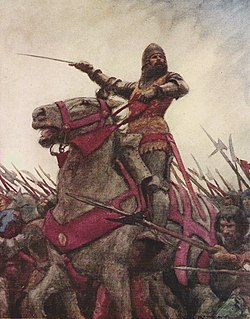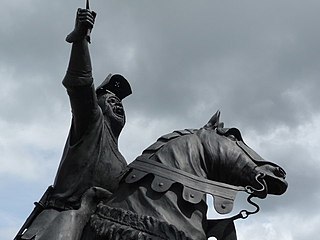Other uses
- Alys (TV series), a television drama series on S4C
Alys is a feminine given name. Notable people with the name include:

Owain ap Gruffydd, commonly known as Owain Glyndŵr or Glyn Dŵr, was a Welsh leader who led a fierce and long-running war of independence with the aim of ending English rule in Wales during the Late Middle Ages. He formed the first Senedd, and he was the last native-born Welshman to hold the title Prince of Wales.

Prince of Wales is a title historically used by native, independent Welsh princes and since the 14th century by the heir apparent of the English and later British throne.
Iolo Goch was a medieval Welsh bard who composed poems addressed to Owain Glyndŵr, among others.
Owain ap Gruffydd may refer to:
The Golden Valley is the name given to the valley of the River Dore in western Herefordshire, England. The valley is a picturesque area of gently rolling countryside. It lies in the lee of the Black Mountains, Wales.
Catrin may refer to:
Margaret Hanmer, sometimes known by her Welsh name of Marred ferch Dafydd, was the wife of Owain Glyndŵr. Although some modern histories have accorded Margaret the title "Princess of Wales", there is no contemporary record that Hanmer used either that title or her husband's earlier title of Prince of Powys. "Princess of Wales", an English honorific given to the wife of the English prince of Wales, was first used by Joan of Kent. Only one wife of a Welsh prince is known to have used the title: Eleanor de Montfort, wife of Llywelyn ap Gruffudd, the last Prince of Wales.
Tristan or Tristram or Tristen is a given name of Welsh origin. It originates from Welsh "Drystan" influenced by the French word "triste".
Events from the 1400s in England.
Sir John Scudamore was a 15th-century English landowner from Herefordshire who acted as constable and steward of a number of Royal castles in South Wales. Active in fighting with the Welsh in 1402, he was still living in 1432, when it was discovered that he had married a daughter of Owain Glyndŵr.
Gethin is a Welsh name with two possible origins. It may mean "dark-skinned, swarthy". In other cases it may originate as a familiar form of the Old Welsh name Grippiud, modern Gruffydd and Griffith. It may refer to:

The Glyndŵr Rising was a Welsh rebellion led by Owain Glyndŵr against the Kingdom of England during the late Middle Ages, it lasted 15 years from 1400 to 1415. It was the last Welsh war of independence.
Ieuan is one of several Welsh forms of the male given name John.
Owen is usually an anglicised variant of the Welsh personal name Owain. Originally a patronymic, Owen became a fixed surname in Wales beginning with the reign of Henry VIII. Etymologists consider it to originate from Eugene meaning 'noble-born'. According to T. J. Morgan and Prys Morgan in Welsh Surnames: "the name is a derivation of the Latin Eugenis > OW Ou[u]ein, Eug[u]ein ... variously written in MW as Ewein, Owein, Ywein. LL gives the names Euguen, Iguein, Yuein, Ouein. The corresponding form in Irish is Eoghan." Morgan and Morgan note that there are less likely alternative explanations, and agree with Rachel Bromwich that Welsh Owein "is normally latinised as Eugenius", and that both the Welsh and Irish forms are Latin derivatives.
Tudur, from old Welsh Tutir, is the Welsh form of the given name Theodoric and may refer to:
Ferch may refer to:
Owain is a name of Welsh origin, variously written in Old Welsh as Ougein, Eugein, Euguen, Iguein, Ou(u)ein, Eug(u)ein, Yuein, and in Middle Welsh as Ewein, Owein, and Ywein. Other variants of the name Owain include Ewein, Iguein, Owein, Ouein, Ywen, Ywein, Ywain, Yuein, and Yvain. Owain has also been Latinized as Oenus.

Kentchurch Court is a Grade I listed stately home 1,200 yards (1,000 m) east from the village of Kentchurch in Herefordshire, England.
Fychan is a surname. Notable people with the surname include:

English rule in Wales refers to the rule of Welsh territories or the whole of Wales by English monarchs and governments. Wales was first invaded by the Kingdom of England following England's own conquest by the Normans in the 12th century and by the end of the 13th century. Wales had become a principality within the Realm of England. Owain Glyndŵr launched an uprising against English rule in the early 15th century which managed to conquer much of Wales until his defeat to English forces.